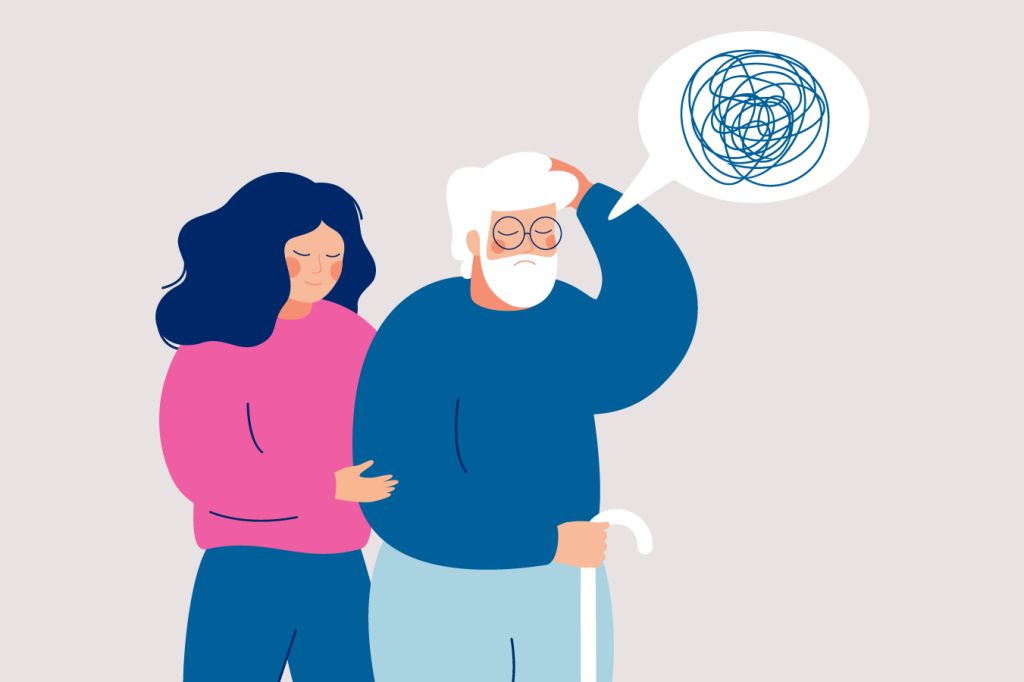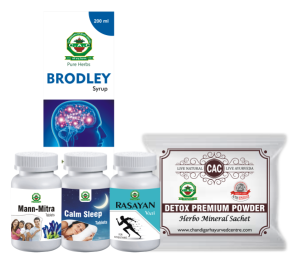
Dementia Causes, Sign and Symptoms and Herbal Treatment
- 29 Sep, 2021
- Posted by admin
- 0 Comment(s)
- Dementia is a wide term that elaborates a loss of thinking, power to memorize things, and other mental abilities.
- Dementia can be caused by a lot of factors. In this disease mainly the areas of your brain used for learning, decision-making ability, intellectual ability, thinking, memory, and language are damaged.
- It is also called a major neurocognitive disorder. Dementia isn’t a disease. Instead, it’s a group of symptoms that developed due to various other factors.
- Around 5 to 10 percent of people over age 60 have dementia. This percentage duplicates after every 5 years. Around half of people in their 80s have some dementia.
- Alzheimer’s is the common reason behind dementia. Approximately 60%-80% of people with dementia have Alzheimer’s disease. However, there are other causes of dementia as well.
- Dementia symptoms may get better with treatment.
Causes and Risk Factor
- Degenerative neurological diseases are a major cause of dementia. These include Alzheimer’s, Huntington’s, Parkinson’s, and some other types of diseases. These diseases get worse as time passes.
- For people who are having vascular disorders, these conditions affect the blood circulation in the brain.
- Traumatic brain damage caused by car accidents, concussions, falls, etc.
- Infections of the C N S. These conditions include HIV, inflammation of protective membranes, and Creutzfeldt-Jakob disease.
- Alcohol or drug abuse.
- Fluid accumulation in the brain.
Some lifestyle and physical constituents can put you at a higher chance of having dementia, including:
- Age factor
- History of dementia in your family
- Diseases including Down syndrome, heart diseases, diabetes, and sleep apnea
- History of Depression
- Smoking, heavy alcohol intake, poor diet, and lack of physical exercise
Signs and Symptoms
People with dementia face difficulty with thinking, intellectual ability, and remembering which affect their skill to manage their routine life. These are some signs to watch for:
- Short-term memory loss, like forgetting small things where you put certain things like keys or repeating the same question over and over again.
- The trouble with communication like not being able to come up with a sentence.
- Getting lost.
- The trouble with intricate but familiar tasks, like paying bills or organizing meals.
- Personality transitions, like depression, paranoia, agitation, and mood swings.
Types of Dementia
Dementia can be divided into 2 groups based on which region of the brain is affected.
- Cortical dementia occurs because of issues in the cerebral cortex part, the outermost layer of the brain. Thinking, memory, and language are majorly controlled by the cerebral cortex. People with this dementia generally have extreme memory loss and can’t remember routine terms or understand language. Alzheimer’s disease and Creutzfeldt-Jakob disease are two patterns of cortical dementia.
- Subcortical dementia develops because of issues in the regions of the brain beneath the cortex. People with subcortical dementia likely to express transitions in their speed of thinking and ability to initiate activities of routine life. Usually, people with this disease don’t have short-term memory loss and speech troubles. HIV, Parkinson’s disease, and Huntington’s disease can cause these types of dementia.
Stages of Dementia
Generally, these are the stages of dementia. But stages may vary depending on the region of the brain that is involved.
- No impairment. Some individuals at this stage will have no symptoms, but tests may exhibit a problem.
- Very mild decline. You may notice a mild transformation in behavior, but your family members will still be independent.
- Mild decline. Patients will notice more alterations in their thinking ability and reasoning. They may represent problems in making plans, and they may repeat their words a lot. They may also have a tough time remembering the latest incidents.
- Moderate decline. The patient will have more difficulties with organizing plans and remembering the latest occasions. They might have difficulties with traveling, arrange bookings, handling cash, and making payments.
- Moderately severe decline. The patient may not remember their mobile number or their relative’s names. They may be puzzled about the time of day or date or name of the day in the week. At this time, the patient will need support with some basic day-to-day activities, like picking out clothes to wear.
- Severe decline. Patients will begin to forget the name of their wife/husband. They’ll need assistance while having meals and going to the toilet. You may also see an alteration in their personality, behavior, and emotions.
- Very severe decline. They can no longer express their thoughts in sentences. They lose the ability to walk and will spend most of the time in bed.
Ayurveda in Dementia
- Modern medicine has not yet found a complete cure or treatment for dementia. There is no surety to reverse the disease.
- That’s why Ayurveda aims at preventing, controlling, and managing dementia with natural methods.
- Ayurveda is based on a holistic approach of treatment that endorses and supports equilibrium in various forms of human life: the physical body, mind, and soul
- Ayurveda promotes the importance of a healthy diet for the proper functioning of the brain. An active and anxiety-free lifestyle is beneficial in achieving a subtle memory even as you age.
- Vedic science has introduced the world much medicinal flora and herbal formulations that are effective in slowing down brain aging.
Natural herbs that work well for enhancing memory:
Brahmi: Brahmi is a well-known brain booster. It sharpens memory, reduces depression, and fights stress. Brahmi also acts as an anti-depressant, tranquilizer, and brain function enhancer.
Licorice: Licorice enhances reasoning power and memory. It has anti-aging effects on the brain by preventing the degeneration of brain cells.
Turmeric: Turmeric could help to enhance the memory of older people and improves mood. It contains antioxidants, curcumin, and curcuminoids, it fights with free radicals. Turmeric helps in reducing swelling of brain tissues, improves sleep, decreases anxiety and stress, and acts as a brain relaxant.
Ashwagandha: It gives overall nourishment to the brain and acts as a rejuvenator. Ashwagandha repairs brain cells from further damage. It prevents and reverses the damage resulting from dementia.
Chandigarh Ayurved center provides Brodley syrup, Tagaradi churna, Nerveup tablet, Rasayan Vati, and detox premium powder for the overall management of dementia.

